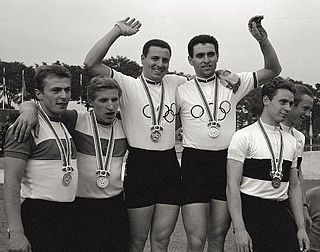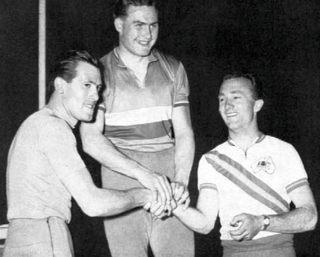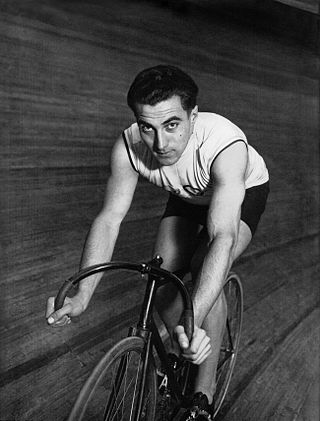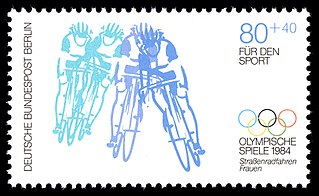Related Research Articles

New Zealand competed at the 1972 Summer Olympics in Munich, West Germany. For the first time at the Olympics, God Defend New Zealand was played instead of God Save the King/Queen. The New Zealand Olympic Committee was represented by 89 competitors, 82 men and 7 women, who took part in 63 events in 14 sports.
The women's sprint event in cycling at the 2004 Summer Olympics consisted of a series of head-to-head matches in which cyclists made three laps around the track. Only the time for the last 200 metres of the 750 metres covered was counted as official time.

The United States of America (USA) competed at the 1992 Summer Olympics in Barcelona, Spain. 545 competitors, 355 men and 190 women, took part in 248 events in 28 sports. At the closing ceremony, a segment of American culture was performed, as the country hosted the next Olympics in Atlanta.

Denmark competed at the 1920 Summer Olympics in Antwerp, Belgium. 154 competitors, 150 men and 4 women, took part in 66 events in 14 sports.

The men's sprint was a track cycling event held as part of the Cycling at the 1964 Summer Olympics programme. It was held on 17 and 18 October 1964 at the Hachioji Velodrome. 39 cyclists from 22 nations competed. Nations were limited to two cyclists each. The event was won by Giovanni Pettenella of Italy, the nation's second consecutive and fourth overall victory in the men's sprint. Sergio Bianchetto took silver, making it the second consecutive Games in which Italy had two men on the podium in the event. It was also the fifth straight Games with Italy taking at least silver. Daniel Morelon of France took bronze, the first of his record four medals in the event.

The men's tandem was a track cycling event held as part of the Cycling at the 1964 Summer Olympics programme. It was held on 21 October 1964 at the Hachioji Velodrome. 13 pairs competed.
The men's individual pursuit was a track cycling event held as part of the Cycling at the 1964 Summer Olympics programme. The course was 4000 metres. It was the first time the event had been held at the Olympics and took place on 16 October and 17 October 1964 at the Hachioji Velodrome. 24 cyclists competed.
The men's team pursuit was a track cycling event held as part of the Cycling at the 1964 Summer Olympics programme. The course was 4000 metres. It was held on 19 October and 21 October 1964 at the Hachioji Velodrome. 18 teams of 4 cyclists each competed.

The men's sprint or "scratch race" at the 1956 Summer Olympics in Melbourne, Australia, was held from 3 to 6 December 1956. There were 18 participants representing 18 nations in competition, with one additional non-starter. Each nation was limited to one cyclist. The event was won by Michel Rousseau of France, the nation's first victory in the men's sprint since 1928 and fifth overall. Guglielmo Pesenti of Italy earned silver and Dick Ploog of Australia finished third for bronze.

The men's sprint event was part of the track cycling programme at the 1920 Summer Olympics. There were 37 competitors from 11 nations, with each nation apparently limited to four cyclists. The event was won by Maurice Peeters of the Netherlands, the nation's first victory in the men's sprint. Two British cyclists, Thomas Johnson and Harry Ryan, were in the final as well, taking silver and bronze.
Desmond "Des" Ronald Thomson is a former racing cyclist from New Zealand.

The men's sprint cycling event at the 1932 Summer Olympics took place on August 1 and 3. The format was a sprint of 1000 metres. There were nine competitors from nine nations, with each nation limited to one cyclist. The event was won by Jacobus van Egmond of the Netherlands, the nation's second victory in the men's sprint. It was the fourth consecutive Games that the Netherlands reached the podium in the event. France made the podium for the third consecutive Games, with Louis Chaillot taking silver. Bruno Pellizzari gave Italy its first men's sprint medal with his bronze.
The women's 200m Sprint at the 2000 Summer Olympics (Cycling) was an event that consisted of cyclists making three laps around the track. Only the time for the last 200 metres of the 750 metres covered was counted as official time. The races were held on Monday, 18 September, Tuesday, 19 September, and Wednesday, 20 September 2000 at the Dunc Gray Velodrome.

The men's sprint at the 1928 Summer Olympics took place at the Olympic Stadium in Amsterdam. There were 18 competitors from 18 nations, with each nation limited to one cyclist. The event was won by Roger Beaufrand of France, the nation's second consecutive and fourth overall victory in the men's sprint. Antoine Mazairac of the Netherlands, the only other nation to have won a gold medal in the event, put the Dutch team on the podium for the third consecutive Games with his silver. Willy Hansen earned Denmark's first medal in the event, with his bronze.

Auguste Moïse Daumain (1877-1938) was a French racing cyclist who competed in the late 19th century and early 20th century. He participated in Cycling at the 1900 Summer Olympics in Paris and won the bronze medal in the men's 25 kilometre race. In the men's sprint, he finished third in the second heat and third in the fourth heat in the quarterfinals.
Jeremy Adam Duvendeck is a retired American professional track cyclist. He represented the United States in two editions of the Olympic Games, and later claimed two elite national titles each in men's sprint (2003) and Keirin (2006) at the U.S. Track Cycling Championships. Before retiring to focus on his coaching career in 2009, Duvendeck rode for the Momentum Cycling Team.
The Women's 200m Sprint at the 1996 Summer Olympics Cycling was an event that consisted of cyclists making three laps around the track. Only the time for the last 200 meters of the 750 meters covered was counted as official time. The races were held on Wednesday, July 24, Thursday, July 25, Friday, July 26, and Saturday, July 27, 1996 at the Stone Mountain Velodrome.

The men's sprint at the 1960 Summer Olympics in Rome, Italy was held on 26 to 29 August 1960. There were 30 participants from 18 nations. For the first time since 1924, nations were allowed to have more than one competitor each ; for the first time since 1924, one nation took multiple medals. Italians Sante Gaiardoni and Valentino Gasparella won gold and bronze, giving Italy a four-Games podium streak with three total gold medals—second all-time behind France's five. Leo Sterckx's silver was Belgium's first medal in the men's sprint.

The men's sprint cycling event at the 1984 Summer Olympics took place from 31 July to 3 August and was one of eight cycling events at the 1984 Olympics. Once again, the limit on cyclists per nation was raised to 2. The event was won by Mark Gorski of the United States, the nation's first victory in the men's sprint and first medal in the event since John Henry Lake took bronze in 1900. The final was all-American, as Nelson Vails took silver, becoming the first Olympic cycling medalist of African descent. Japan earned its first medal in the men's sprint with Tsutomu Sakamoto's bronze. France's five-Games podium streak in the event ended.
The men's sprint cycling event at the 1988 Summer Olympics took place from 21 to 24 September and was one of the nine cycling events at the 1988 Olympics. There were 25 competitors from 25 nations. After the 1984 Games had featured a humongously bloated 34-cyclist, 11-round, 63-match competition, the competition size was cut down by restricting nations to one cyclist yet again and instituting a qualifying round: this reduced the format to 25 cyclists, 8 rounds, and 29 matches. The event was won by Lutz Heßlich of East Germany, the 1980 gold medalist who was unable to compete in 1984 due to the Soviet-led boycott. Soviet cyclist Nikolai Kovsh took silver, the best result to date for the Soviets. Gary Neiwand of Australia earned bronze; for the Australians, it was the first medal in the event since 1972.
References
- ↑ Evans, Hilary; Gjerde, Arild; Heijmans, Jeroen; Mallon, Bill; et al. "Michael Belcourt Olympic Results". Olympics at Sports-Reference.com. Sports Reference LLC. Archived from the original on 18 April 2020. Retrieved 31 July 2016.
- ↑ "Temple de la renommée". Fédération québecoise des sports cyclistes (in French). Retrieved 1 May 2020.